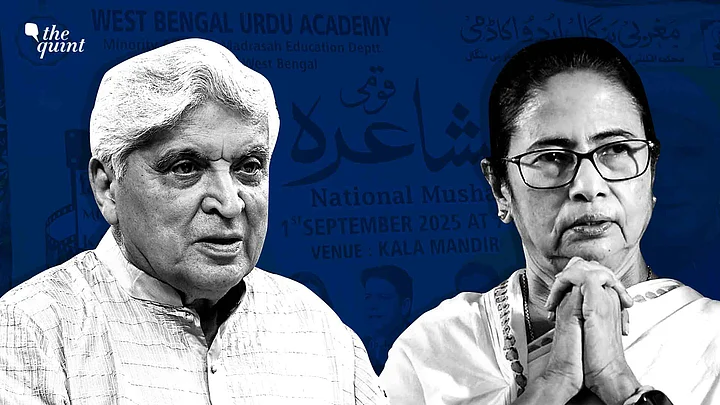The West Bengal Urdu Academy's decision to cancel their National Mushaira on 1 September with famous Bollywood lyricist and self-declared atheist Javed Akhtar has created a major controversy and a battle of discourse between leftist seculars and some Muslim activists.
Whereas an author has claimed hypocrisy on the part of Javed Akhtar due to ‘selective atheism’ (something he vehemently denied), others have pointed out his strong secular credentials and how such decisions unfortunately mix religion with language.
But most of the authors have ignored the internal state politics where radical Islamic leaders are trying to consolidate Muslim identity along illiberal lines. Even some weeks back, the discussion around Bengali Muslims was happening around humanitarian lines or as development actors with issues like why they migrate to other states looking for menial work as cleaners, waste pickers, domestic workers. This controversy, created by local All India Trinamool Congress (TMC) leaders has brought them back to the domain of emotional and symbolic politics.
TMC's Identity Math
According to media reports, Jamiat-e-Ulama, a powerful Islamic religious organisation, had strongly opposed the participation of Javed Akhtar in the state government-backed Urdu Academy programme, and threatened state wide protests if their objections were ignored.
In a letter calling for the same, Akhtar was called a ‘Shaitan’ who has spoken ill against Muslims, Islam, and Allah. In another letter by Maulana Siddiqullah Chowdhury, who heads the Bengal unit of the organisation and is currently serving as the library minister in the Mamata Banerjee government, warned his own government that Jamiat Ulama-e-Hind would repeat similar protests such as the time they forced the state government to expel writer Taslima Nasrin from Kolkata.
Invoking Taslima Nasrin to stop the Urdu Academy programme is to remind the state government that his organisation can exert street power to cripple the capital when it comes to politics of emotions on Muslim issues.
In the year 2025, Maulana Chowdhury faced many ups and downs within his own party. During the anti-Waqf Bill protests in Kolkata on 10 April, he announced from a stage that the Chief Minister called him to express satisfaction with the rally he helped organise.
His relationship with the party, however, soured soon. During a visit to his Assembly constituency in Bardhaman district in July, local TMC workers led by another Muslim leader, Ahmad Hossain Shaikh, allegedly attacked his convoy, citing his long absence and lack of development in basic health and education infrastructure of the region as the cause for their anger.
The library minister then threatened to quit the TMC if the attackers were not expelled, saying that a section with the party led by the TMC Zilla Parishad member Azizul Hoque wanted to kill him. While he was pacified after CM Banerjee assured him support, the incident left him vulnerable within the local party organisation.
We cannot ignore these internal party dynamics behind the Javed Akhtar controversy after which Maulana Chowdhury has re-established his authority.
Symbolic Politics vs Socioeconomic Reality
Partition in 1947 resulted in severe marginalisation and dispossession for the Bengali Muslims, as the urban educated leadership migrated to East Pakistan and rural peasants stayed on in poorer districts like Murshidabad, Malda, Uttar Dinajpur.
Scholars have argued that due to the left-dominated state politics focusing on class struggle for decades after independence, the Muslim question in West Bengal remained dormant. It is only after the arrival of the Mandal Commission report, which recognised backward Muslim castes in West Bengal, and the publication of the Justice Sachar Commission report in 2006, which showed extreme backwardness within the community, that Muslim emerged as actors in the development saga.
However, the post-Sachar Muslim leadership in the state dominated by the likes of Siddiqullah Chowdhury have always preferred to show their muscle power on symbolic and emotional causes rather than socioeconomic factors.
During the expulsion of the writer Taslima Nasrin in 2007, former TMC MP, the late Idris Ali, who headed All India Minority Forum, and Chowdhury publicly fought to claim credit for spearheading the protests “in a bid to become the community’s representatives.”
One of the biggest rallies in Kolkata organised on 30 March 2013 by all major Muslim organisations, happened not because of state apathy towards Muslims' jobs or education, but on a completely unrelated subject of genocidal trial in Bangladesh by the Hasina government.
In the last few months, thousands of Bengali Muslim migrant workers are harassed, physically tortured and branded as Bangladeshi in different BJP-ruled states. But we have witnessed no threat of protests from these TMC leaders or even shown the desire to question their own government about why Muslim-majority districts are behind in every health and educational indices.
Today, when Muslim students across the state are complaining that the new Other Backward Castes (OBC) policy framed by the TMC government following High Court and Supreme court’s intervention has discriminating against them in jobs and university admissions, these leaders are silent on the matter.
Symbolic and emotional issues allow Muslim groups to assert their presence and exert some authority in the state. This is part of elite politics that they are comfortable with.
Political parties prefer to deal with such causes and leaders because they can always pacify them with tokenistic decisions without implementing any structural changes to address the socioeconomic concerns of the Muslim community.
Cancelling Javed Akhtar’s participation in the Urdu Academy event is one of many tokenistic politics by the TMC that is cheered by Jamiat-e-Ulama.
(Adil Hossain is a faculty at the School of Development, Azim Premji University. He can be reached at @adilhossain. This is an opinion piece and the views expressed are the author’s own. The Quint neither endorses nor is responsible for the same.)
